Volume 23, Issue 1
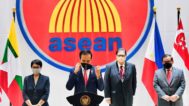
Regional Overview
January — April 2021Change in Style, Continuity in Asia Policy
Quadrennially, we write to assure readers that there will be more continuity than change as a new foreign policy team takes office. Globally, this would not be the case this year. In its first few months, the Biden administration made 180-degree turns on issues such as climate change, World Health Organization membership, the role of science in the battle against COVID-19, immigration, and the Iran nuclear agreement. In our region, however, there has been more continuity. The Trump administration’s Indo-Pacific strategy focused on the Quad—the informal but increasingly structured grouping of Australia, India, Japan, and the US—and the Biden administration has doubled down on this effort, conducting the first (virtual) Quad summit. It has largely continued the “cooperate when we can but confront when we must” approach toward China. And while Trump appeared to have disdain for US alliances, every national security document from his administration underscored the central role US alliances played in its Asia strategy.
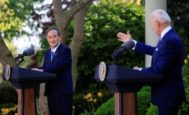
US - Japan
January — April 2021Suga and Biden Off to a Good Start
The early months of 2021 offered a full diplomatic agenda for US-Japan relations as a new US administration took office. Joe Biden was sworn in as the 46th president of the United States amid considerable contention. Former President Donald Trump refused to concede defeat, and on Jan. 6, a crowd of his supporters stormed the US Capitol where Congressional representatives were certifying the results of the presidential election. The breach of the US Capitol shocked the nation and the world. Yet after his inauguration on Jan. 20, Biden and his foreign policy team soon got to work on implementing policies that emphasized on US allies and sought to restore US engagement in multilateral coalitions around the globe. The day after the inauguration, National Security Advisor Jake Sullivan reached out to his counterpart in Japan, National Security Secretariat Secretary General Kitamura Shigeru, to assure him of the importance the new administration placed on its allies. The COVID-19 pandemic continued to focus the attention of leaders in the United States and Japan, however.
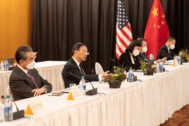
US - China
January — April 2021Continuity Prevails in Biden’s First 100 Days
In its final days, the Trump administration took more actions to impose costs on China for its objectionable policies and to tie the hands of the incoming Biden team. The first 100 days of President Biden’s administration revealed substantial continuity in policy toward Beijing, with strategic competition remaining the dominant feature of the US-China relationship. Senior Chinese officials delivered speeches that pinned blame entirely on the US for the deterioration in bilateral ties. A round of combative, yet serious, talks took place between senior US and Chinese officials in Anchorage, Alaska. The US added new sanctions on Beijing for undermining Hong Kong’s autonomy. In coordination with its allies, Washington imposed sanctions on Chinese individuals deemed responsible for carrying out genocide and crimes against humanity in Xinjiang. Steps were taken by the US to demonstrate “rock-solid” support for Taiwan in the face of stepped-up Chinese coercion. Cooperation on climate change was launched with John Kerry’s visit to Shanghai to meet with his counterpart Xie Zhenhua, and Xi Jinping’s participation in the US-led Leaders Summit on Climate.
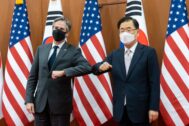
US - Korea
January — April 2021Hope Springs Eternal
In the first four months of 2021—the first three and a half of a Biden administration focused on domestic progress and COVID-19 vaccinations—US relations with the Korean Peninsula assumed familiar contours after four years of an unorthodox Trump administration. The US and South Korea quickly reached a military burden-sharing agreement and pledged cooperation in a variety of areas, although the regular differences of opinion lurk under the surface regarding how closely Seoul should work with both North Korea and Japan. The US-China rivalry remains a shadow over the Asia-Pacific security and political economy situation, complicating South Korea’s regional hedging strategy. Finally, North Korea’s nuclear program advanced apace, US and South Korean attempts to open dialogue were rebuffed, and the Biden team’s North Korea policy review will not endear it to Pyongyang.

US - Southeast Asia
January — April 2021ASEAN Confronts Dual Crises
The Feb. 1 coup in Myanmar dealt a serious blow to the ASEAN diplomatic order and presented the incoming Biden administration with its first major policy challenge in Southeast Asia. More profoundly, the coup set into motion a political and humanitarian crisis that has pushed Myanmar into an economic free fall. The imposition of Western sanctions gave China and Russia an opening to strengthen ties with the Tatmadaw. Myanmar was an extreme example of political turmoil, but the instability surrounding Thailand’s anti-regime and anti-monarchy movement persisted into the new year. In January, Vietnam embarked upon a more orderly political transition through the 13th National Party Congress, resulting in a leadership structure focused on ensuring stability, both external and internal.

China - Southeast Asia
January — April 2021Beijing’s Advances Complicated by Myanmar Coup and US Resolve
Beijing confidently forecast continued advances in high-priority efforts promoting regional economic integration, ASEAN’s prominence as China’s leading trade partner, as well as strengthening supply chain connections disrupted by the pandemic and US trade and economic restrictions. Ever-closer cooperation to counter COVID-19 saw Chinese pledges add to its leading position providing more than 60% of international vaccines to Southeast Asian countries. Nevertheless, the unexpected coup and protracted crisis in Myanmar headed the list of important complications. The incoming Biden administration showed no letup in US-led military challenges to China’s expansionism in the South China Sea, while strong high-level US government support for the Philippines in the face of China’s latest coercive moves supported Manila’s unusually vocal protests against the Chinese actions. Beijing also had difficulty countering Biden’s strong emphasis on close collaboration with allies and partners, seen notably in the first QUAD summit resulting in a major initiative to provide 1 billion doses of COVID vaccines for Southeast Asia and nearby areas. The effectiveness of Chinese vaccines was now questioned by Chinese as well as foreign specialists and Beijing’s domestic demand was growing strongly, slowing donations and sales abroad.

China - Taiwan
January — April 2021Taiwan Prospers, China Ratchets Up Coercion, and US Support Remains “Rock-solid”
For the leadership of Taiwan, the significance for Taiwan’s relationships with the US and China of the end of the Trump administration and the arrival of the Biden administration formed the defining concern as 2021 began. Taiwan welcomed two steps that the Trump administration took in its waning days: announcing a visit to Taiwan by the US ambassador to the UN (even though it was later cancelled) and repudiating the longstanding Taiwan Contact Guidelines, which was widely seen in Taiwan as overly restrictive. Taiwan’s anxieties regarding the Biden administration were quickly allayed, as incoming senior officials repeatedly called US support for Taiwan “rock solid” and issued new far less restrictive Guidelines. Taiwan also benefited from unusually direct expressions of support from Japan and other international partners.
Taiwan’s economy continued to boom despite the pandemic, but its dominance in high-end computer chip production became the subject of worries by US officials and industry groups over supply chain security. China’s military activities near Taiwan included two days of especially intense activity, which were clearly intended to signal its displeasure with the Biden administration’s support for Taiwan. China also banned the import of Taiwanese meat and pineapples and announced preferential treatment for Taiwan investors in mainland agriculture, all clearly targeted at disrupting support for Taiwan’s ruling Democratic Progressive Party and President Tsai Ing-wen among its rural political base. Both strategies appeared more likely to backfire than not. Increasing tensions between the US and China, especially over Taiwan, have led to concerns on all sides that a diplomatic or military confrontation may be growing more likely.
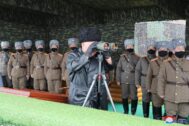
North Korea - South Korea
January — April 2021The Sound of One Hand Giving
As in 2019-20, inter-Korean ties remained frozen, other than a rare lawsuit. Revelations that in 2018 Moon Jae-in’s government had pondered building the North a nuclear power plant caused a brief furor. Seoul’s propaganda balloon ban backfired, prompting widespread criticism—but no thanks from Pyongyang, which was also unimpressed by scaled-down US-ROK war games. North Korea tested its first ballistic missile in nearly a year, amid concerns of a new arms race; some analysts deemed the South culpable, too. Kim Jong Un’s sister Kim Yo Jong fired four verbal volleys, mostly insults. Another undetected defector highlighted failings in ROK border security. MOU Lee In-young was ubiquitous and loquacious, but scattergun in the causes he championed. Moon’s government remained reticent, or worse, regarding DPRK human rights abuses. With just a year left in office, and notwithstanding rare criticism of the North by ministers, Moon was expected to double down on engagement despite Pyongyang’s lack of reciprocity.
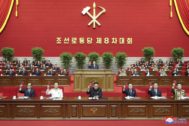
China - Korea
January — April 2021China-Korea Relations Poised for Recovery Despite Intensified Conflict on Social Media
China’s relations with North and South Korea gained momentum in the first four months of 2021. China-North Korea relations were propelled by an exchange of messages between North Korean leader Kim Jong Un and Chinese President Xi Jinping around North Korea’s successful convening of the Worker’s Party of Korea’s (WPK) Eighth Party Congress, the appointment of former North Korean Trade Minister Ri Ryong Nam as North Korea’s new ambassador to China, and another round of messages in March that emphasized the importance of close relations. In a Jan. 21 Cabinet meeting, South Korean President Moon Jae-in pledged to develop relations with China to new heights, and in a Jan. 26 telephone call with Moon, Xi expressed support for Korean denuclearization and joint development of China-South Korea relations. China and South Korea held consultations on maritime enforcement cooperation, defense lines of communication, health security, and free trade negotiations.
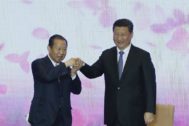
Japan - China
January — April 2021The Gloves Come Off
After several years of seeking to counter each other while insisting that their relations were at a recent best, Tokyo and Beijing became overtly contentious. A major event of the reporting period was China’s passage, and subsequent enforcement, of a law empowering its coast guard to take action, including through the use of force, to defend China’s self-proclaimed sovereignty over the Japanese administered Diaoyu/Senkaku Islands in the East China Sea. Heretofore reluctant to criticize Beijing over its actions in Xinjiang and Hong Kong, Japanese Foreign Minister Motegi Toshimitsu finally did so in April, and pledged to work with the United States to resolve China-Taiwan tensions. Chinese Foreign Minister Wang Yi warned that a continuation of such moves would cause Chinese-Japanese ties to hit bottom and threatened retaliation for any interference on Taiwan. No more was heard about a long-postponed Xi Jinping visit to Japan.
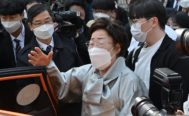
Japan - Korea
January — April 2021Difficult to Disentangle: History and Foreign Policy
Unsurprisingly, historical issues proved difficult to disentangle from other foreign policy issues in Japan-South Korea relations, which remained at the “worst level since the normalization” in the first four months of 2021. The Seoul Central District Court’s ruling on Jan. 8 that the Japanese government should pay damages to victims of sexual slavery during World War II set the tone for contentious relations at the beginning of the year. While the Moon Jae-in administration made gestures to mend ties, the Suga administration maintained that South Korea should take concrete measures to roll back the 2018 South Korean Supreme Court ruling on Japanese companies requiring them to compensate wartime forced laborers. Export restrictions levied by Japan against South Korean companies in 2019 remain in place, while the case is with the World Trade Organization after South Korea reopened a complaint in 2020 that was filed and then suspended in 2019.

China - Russia
January — April 2021Empire Strikes Back at Moscow and Beijing
For Moscow and Beijing, the changing of the guard in the White House in January 2021 meant no reset of ties with Washington. Instead, the newly inaugurated Biden administration turned the screws on both China and Russia by reinvigorating alliances, firming up sanctions, and prioritizing force deployment, particularly to the Indo-Pacific region. In contrast to Biden’s multifaceted diplomatic offensive, China and Russia seemed passive, if not inactive, both in terms of their bilateral ties and their respective relations with the US. Top Russian and Chinese diplomats met in person just once in the first four months of 2021 in the middle of sharply escalated tensions across the Taiwan Strait and in East Ukraine. Meanwhile, Beijing and Moscow waited to see if the transition from Trumpism would lead to a brave new world (“new concert of powers”), a grave new world of Kissingerian “great games” in the era of WMD plus AI, or something in between.

Japan - Southeast Asia
May 2020 — April 2021A Diplomatic “New Normal” in the Indo-Pacific Region?
Japan-Southeast Asia relations were relatively stable, despite COVID-19, as summarized by three trends: emphasizing multilateral actors; prioritizing enhancement of bilateral relations with two countries (Indonesia and Vietnam); and the synthesis of Japan’s Free and Open Indo Pacific “vision” (FOIP) and ASEAN’s ASEAN Outlook on the Indo-Pacific (AOIP). Japan and Southeast Asian states managed to achieve tangible cooperation, as illustrated by the establishment of the ASEAN Centre for Public Health Emergencies and Emerging Diseases (ACPHEED). Yet, strategic dynamics among Southeast Asia, Japan, and the United States are shifting because of changes in Japanese and US political leadership. Japan, the most reliable partner for Southeast Asia in the Trump era, seemingly faced a relative decline in the importance attached by Southeast Asia because of the United States’ renewed commitment to the region. In the context of this new diplomatic reality, the foremost challenges that Japan and Southeast Asia will likely face in 2021-2022 are Myanmar and ASEAN Centrality in the Indo-Pacific.